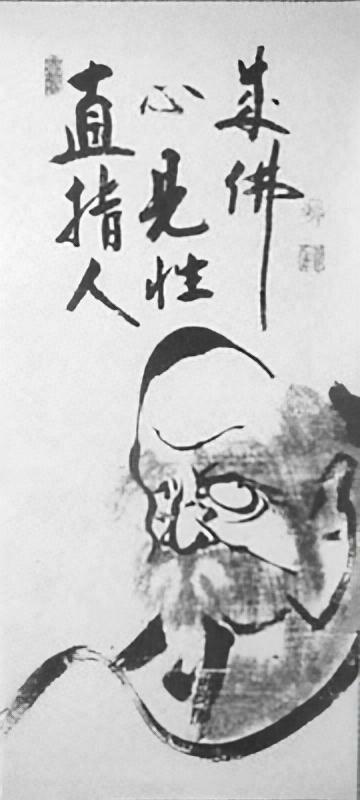Flow, oneness, connection, selflessness, immediacy – all of these notions are central to both Zen Buddhism and jazz improvisation. Hear us chat about the links here:
Tracks we played were ‘Rita‘ by Jazztronik, and ‘Kogun‘ by Toshiko Akiyoshi.

Zen is great fun – it’s whole aim is to mess with your understandings of logic and your normal view of the world. Although Buddhism began in India, the Chan school can be traced back in China to the 6th Century CE; from China it worked its way to Japan, where it became known as Zen. According to the stories, the founder of Chan/Zen was a chap named Bodhidharma (pictured). He’s usually depicted as a hairy, wild-eyed barbarian, which gives you a sense of Zen’s underlying ethos. He was also a madman, by most people’s standards: he sat staring at a cave wall for nine years, cutting off his eyelids after seven to ensure he didn’t fall asleep. In another story, a student kept coming to the cave to be taught by Bodhidharma, but the master wouldn’t take him seriously until the student had cut off his own arm to prove his sincerity. Yup.
The basis of Zen is direct insight, not mediated by logic, texts, teachings, dogma and so on. Enlightenment is taken from nirvana (a perfect state to be attained upon death) and placed in satori – brief flashes of enlightenment that can be experienced in life, when the right practices are cultivated. One practice is the study of koans, which are little nonsensical stories or teachings. A famous one asks, ‘What is the sound of one hand clapping?’ In another, a student asked his master, ‘What is the true meaning of Buddhism?’ to which the master replied, ‘The cypress tree in the courtyard.’ Ideally, these apparently illogical tidbits will snap you out of the strictures of quotidian logic and allow you to experience satori.
You may have also seen the phrase ‘Zen in the art of … gardening/tea-making/painting/archery/etc.’ The idea is that with intense practice, any of these tasks can become a form of meditation. When you become utterly absorbed in them, you are able to let the essence of Zen flow through you, so to speak, and again experience satori. It is here that we find similarities with jazz. Jazz improvisation is all about being ‘in the moment’, being ‘at one’ with your instrument, the audience, the world and so on. Improvisers strive to lose their sense of self while playing, letting themselves become their music. “Like Zen, jazz develops a loose, all-embracing awareness of its subject and a lack of premeditation that allows the musician to suddenly strike the right note.” Playing your instrument becomes the meditation, that allows you to transcend your normal thinking and experience and ‘tap into’ something else.
[I should note that this heightened state is experienced by performers of all stripes, from rappers, to sportspeople, to artists. Psychologists have called it flow,and it can be likened to what many would dub a ‘religious’ experience.]
 The artists we played today are Japanese jazz artists. Although they don’t draw on Zen teachings or principles directly in their music, the parallels between the Zen and jazz experiences are commonly drawn in Japan. Toshiko Akiyoshi is characteristic of a kind of Japanese-jazz fusion, drawing on some traditional Japanese instruments and melodies in her music.
The artists we played today are Japanese jazz artists. Although they don’t draw on Zen teachings or principles directly in their music, the parallels between the Zen and jazz experiences are commonly drawn in Japan. Toshiko Akiyoshi is characteristic of a kind of Japanese-jazz fusion, drawing on some traditional Japanese instruments and melodies in her music.
I wrote about Zen on an old blog of mine many years ago. The koans and stories in this post primarily come from D.T Suzuki’s An Introduction to Zen Buddhism. Our neighbouring radio programme which also deals with religious music, ABC Radio National’s The Rhythm Divine, have also spoken about Zen jazz.
Next week I’m going to try to find some music that’s associated with the Mexican Day of the Dead – wish me luck! And you can keep getting these posts each week by subscribing on the right –>
Confused about Zen? You’re not alone. One disciple said to his master despairingly, “I cannot follow your reasoning.”
“Neither do I understand myself,” concluded the Zen master.

This makes enjoyable reading, however, is your proposal right: that the aim of zen is ‘to mess with your understandings of logic and your normal view of the world’? It is not with ‘intense practise’ that a task becomes meditation – rather the practise, in zen, might remove the intensity altogether – being, as you identify, ‘in the moment’ and ‘at one’.
Apologies if my whistling is out of tune…
Thanks for the comment! I am probably not as well-versed in Zen as I should be. What I understand from D.T. Suzuki and Eugene Herrigal is that Zen is about transcending dualist logic, that is, what is A cannot be not-A; rather, something affirms its identity simply by existing, not than through any human labels.
And I think you’re wholly right about the practise. My lay assumption was that (as with jazz) you’d need to become very good at something before being able to do it ‘without thinking,’ that is, selflessly.
What do you think?
Perhaps that by being very good at doing something-without-thinking, we might yet do anything!